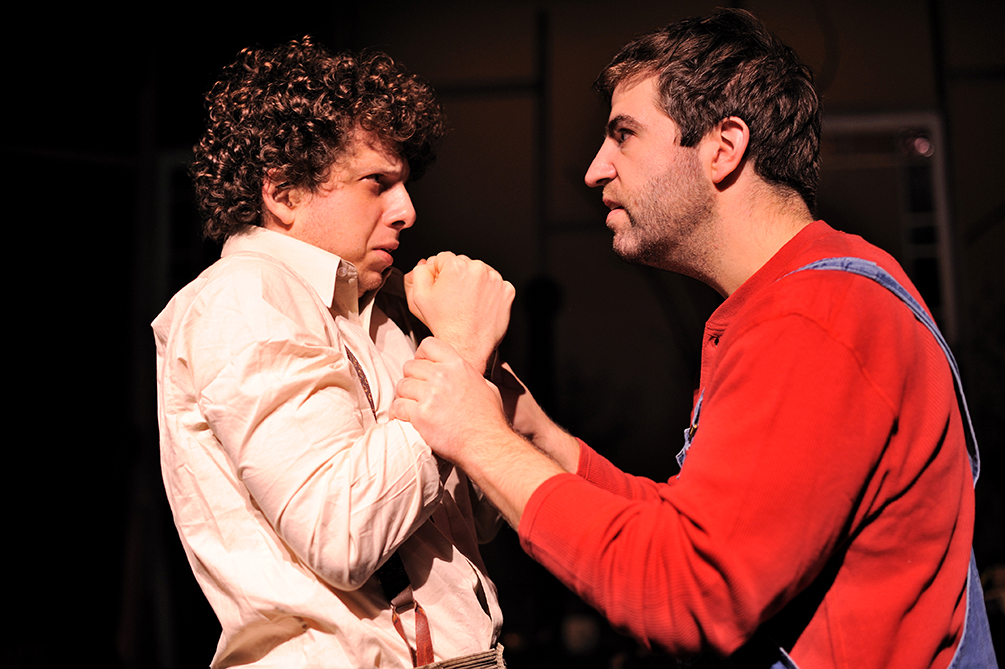
The precocious seven-year-old Buddy eats dirt. Playground tormenter Odd Henderson straddles his squirming body and pins his flailing limbs. “You’re a sissy, and I’m just straightenin’ you out.” Buddy nevertheless continues to snake his spine and wriggle vigorously in futile defiance. He later inveighs against Odd’s evilness: “And I’m speaking of a twelve-year-old boy who hasn’t even had time to ripen!”
One of two holiday-themed Truman Capote short stories in Provision Theater Company’s back-to-back adaptations, “The Thanksgiving Visitor” is an archetypical bully reconciliation tale. The stage version retains all the expected tropes: a geeky victim; stolen spending money; the attempt to feign illness and keep away from school; and a third-party push from his sole caretaker, elderly Miss Sook, to invite the aggressor to Thanksgiving, meeting hatred with goodwill. Nevertheless, the physical violence staged early on tempers this feel-good setup with heightened psychological stakes. Welcome to Depression-era rural America, where adolescent brutality looms larger than name-calling.
Throughout “The Thanksgiving Visitor” and into the subsequent “A Christmas Memory,” actor Max Gannet assumes the two voices of young Buddy and his later, lushly reminiscent adulthood. He credibly sketches childish antics, yet he’s old enough to command dignity—ably tackling the dramatic effort needed to conflate the child and the mature narrator. Provision overcomes the difficulties posed by Capote’s thick prose by translating it wholesale into abundant soliloquies, where the narrator assesses the situation like an Alabaman chorus.
Watching Buddy beaten up is saddening, but seeing this articulate narrator resume the play and take the noogie he’s describing proves wincingly shameful. Buddy is in the household garden with Miss Sook, down on all fours, imitating his rat terrier Queenie. The spotlight slowly moves onto Buddy alone. His eyes glimmer yellow as he straightens up, kneeling like a parishioner. The flannel robe he’s been wearing while sick becomes a grave, oriental jacket. Sook’s oblivious as the narrator now powers gently through an attractively prosodic interjection.
This figure’s abuse is consequently hateful, and the narrator’s own resentment grows understandably caustic. He begins using his powers to focus Buddy’s juvenile, confused anger through a robust literary lens. He gives bulk and shape to the profound feelings his younger self couldn’t express.
Buddy’s not happy when Odd steals the Thanksgiving party with a song: “The jealousy running through me could electrocute a murderer.” When Odd indiscreetly pockets Miss Sook’s cameo—a crime which Buddy invisibly witnesses—”a sizzling light bulb of an idea” burns his mouth “bone dry from the prospect of total revenge.” Buddy denounces Odd at the dinner table, his chair crashing down with the day’s shattered celebratory spirit. But his bid for vengeance backfires, and he flees, full of hot, tearful embarrassment, to the smokehouse. As he contemplates suicide by means of a discovered poison bottle, Gannet’s two voices become practically indistinguishable. Buddy’s distraught tirade and the narrator’s rhetoric crescendo and fuse.
Miss Sook ultimately talks Buddy down and educates him against deliberate cruelty. Sook’s well-traveled moral on two wrongs and a right is well taken, but not borne out so happily by “Visitor’s” epilogue. Odd walks out on Thanksgiving, eventually drops out of school, and joins up with the merchant marine on what’s presumably the eve of the Second World War and the Battle of the Atlantic. Buddy and his foe are hardly reconciled. The narrator reports swaggering satisfaction in Odd’s absence, casting doubt on the lesson’s integrity. Though Odd ultimately returns to perform a neighborly act years later, the kindness is subdued and minimal, almost one-sided, as Odd keeps conspicuously quiet.
“A Christmas Memory” mobilizes the characterization from “Visitor.” It’s a glorified mission to make and distribute fruitcakes, but the mood becomes surprisingly autumnal as Buddy reflects on what’s revealed as his final winter with Sook. She announces “It’s fruitcake weather!” with zeal, finding a windfall of nuts, some unexpected magnanimity in a Native American bootlegger, and a little leftover whiskey along the way. Buddy and Sook fly kites on Christmas day. “I could leave the world with this in my eyes,” she whispers. Yet Buddy leaves her for military academy. We watch her shuffle around upstage, Buddy narrating up front. One winter, Sook can no longer summon the strength to climb from bed. “It’s fruitcake weather!” suddenly embodies dull, empty shock at her surprise disability. Hearing of her death, Buddy concludes with pointed wistfulness: “Home…is where my friend is.”
By twinning Buddy’s boy-self and his older, richly descriptive register in Gannet’s person, “The Thanksgiving Visitor” strains the holiday spirit with an internalized meanness. It spills over into an exhausted fury and an uncertainly hollow resolution. It retains a bittersweet moral, feeling much like Buddy’s clutching, waist-high hug to Miss Sook. The two Capote adaptations both articulate the season’s cheer, but pair it with something as sad as Odd’s broad hands confusedly cupping Sook’s gifted chrysanthemum—as sad as Buddy’s recollection that Queenie’s gone away to bury her Christmas bone in the field where, a year hence, Queenie will herself be buried.
Provision Theater, 1001 W. Roosevelt Rd. Through December 29. See site for showtimes. $10-$32. (312)455-0066. provisiontheater.org
